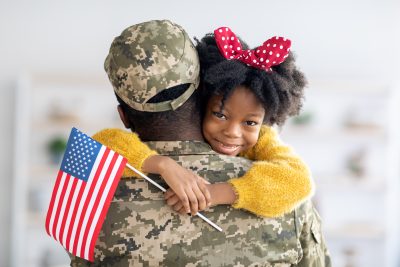A Brief Overview
- This is part one of a two-part series on this topic of the Exceptional Family Member Program (EFMP). This article continues in Part 2: How Does EFMP Benefit Military Families?
- Every branch of the U.S. Armed Forces is required to have a program for dependents of active-duty service members (ADSMs) with special medical or educational needs called the Exceptional Family Member Program (EFMP).
- The Coast Guard is the only branch of service that uses a different name for their program – the Special Needs Program (SNP).
- Enrollment is mandatory for all dependents of active-duty service members who have a special medical or educational need, regardless of the dependent’s age.
- The two standardized enrollment forms are available on Military OneSource and, where available, on branch-specific websites.
- Enrollment support is available on installation at family support centers.
Full Article
The Exceptional Family Member Program (EFMP) is a mandatory program for all branches of the U.S. Armed Forces that helps military dependents with special medical or educational needs. The Army, Navy, Air Force, Marine Corps, and Space Force each have an Exceptional Family Member Program (EFMP). The Coast Guard, which operates under the authority of the Department of Homeland Security, has a similar program called the Special Needs Program (SNP).
Purpose and Intent
The purpose of the EFMP is to –
- identify dependents of servicemembers with special education or medical needs,
- make sure the family’s needs are considered during the assignment process,
- connect families with resources and assistance wherever they are assigned, and
- assist with questions, concerns, and resources.
Although the purpose of EFMP and SNP are the same across all branches of service, there are some differences with names, procedures, and forms. There are also differences by installation, such as the availability of respite care providers and services provided by EFMP Family Support.
Eligibility
Enrollment in EFMP is mandatory for eligible dependents of active-duty service members (ASDMs). It is not an age-limited or age-specific program; dependent children and adults, including spouses, incapacitated adults (unmarried adult children with disabilities, parents and parents-in-law, and other adult dependents), must be enrolled in EFMP if they meet one of the following criteria:
- Have special medical needs, including chronic and/or mental health conditions, that require ongoing treatment from medical specialists.
- Have significant behavioral health concerns.
- Are eligible for or receive early intervention services (EIS) through an Individualized Family Service Plan (IFSP) for infants and toddlers (ages 0-3).
- Are eligible for or receive special education services through an Individualized Education Program (IEP) for students aged 3 through 21.
National Guard and Reserve personnel with family members who have special medical or educational needs may be eligible during the time period when the service member is called for active-duty orders under Title 10 (10 U.S.C.).
Enrollment
Enrollment in EFMP or SNP begins with two enrollment forms that are available for download from Military OneSource:
- DD Form 2792, “Family Member Medical Summary”: This form must be completed by the family member’s TRICARE-authorized primary care provider. This can be either the primary care manager or a specialty care provider.
- DD Form 2792-1, “Special Education/Early Intervention Summary”: The instructions state that the child’s IFSP or IEP must also be provided with this form. If the child has an IFSP, is not yet enrolled in school, or is home-schooled, the parents may complete and sign the fields reserved for the educational authority.
Medical providers often require a separate appointment for completing the EFMP paperwork. Ask about the provider’s policy for completing paperwork and how to submit the forms before the visit while scheduling the appointment. The family member’s TRICARE plan and how the provider bills the appointment will determine whether there will be a copay for the visit.
Although all branches of service use the same standardized forms, some of the services have developed website platforms for families to submit the forms electronically.
- Army’s Enterprise EFMP (E-EFMP)
- Navy Family Accountability and Assessment System (NFAAS),
- Air Force My Vector, also available to Space Force families
Save time in the future by keeping a copy of the completed enrollment forms and IFSP or IEP in your home records system. Never give away your last copy!
Help with Enrollment
If this is the first time the family has submitted the EFMP forms, it is a good idea to first take them to the branch-specific military and family support centers on installations for review, including:
- Army: Soldier and Family Assistance Center
- Navy: Fleet and Family Support Center
- Air Force and Space Force: Military and Family Readiness Center
- Marine Corps: Marine Corps Community Services
- Coast Guard: Health, Safety and Work-Life Service Center
Reserve components also have branch-specific military and family support centers. Learn more about what these programs offer and links to the branch-specific Reserve programs in this article from Military OneSource.
Find your EFMP enrollment or family support. In the drop-down menu for “Program or service”, select “EFMP Family Support” or “EFMP Enrollment”. Then, select your location from the drop-down menu labeled “Location based on”.
Download the EFMP Enrollment Checklist
Learn More about EFMP
This is part of a two-part series on this topic of the Exceptional Family Member Program (EFMP). This article continues in Part 2: How Does EFMP Benefit Military Families?
Additional Resources
- Exceptional Family Member Program (EFMP), Part 2: How Does EFMP Benefit Military Families?
- The Navy’s MyNavy HR website and Navy EFMP smartphone app provide information about EFMP, including both branch-specific procedures and resources to support exceptional families from all branches.
- The Marine Corps provides information about the EFMP program at each of its installations on the Marine Corps Community Services (MCCS) website.
- Benefits of the School Liaison Program from Military OneSource
- Learn about how School Liaisons support military children from Military Interstate Children’s Compact Commission (MIC3)

